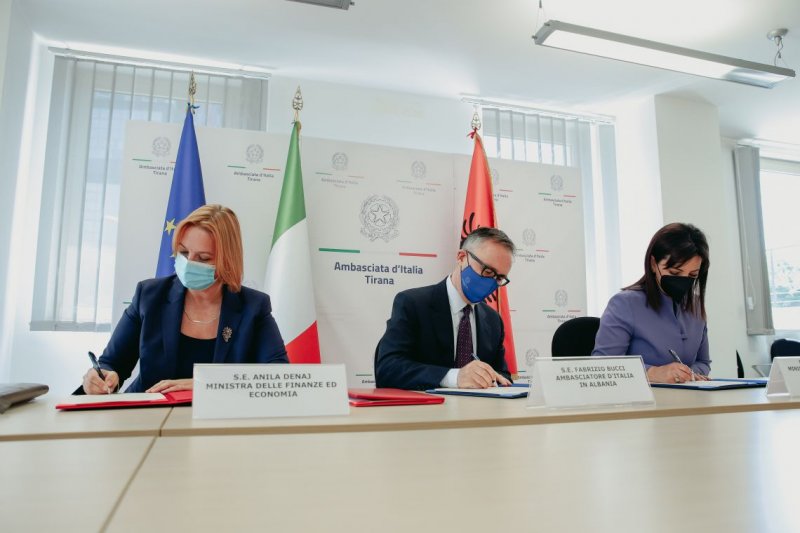Kushi-Denaj-Bucci Sign Deal on Further Encouraging Italian Language in Albania
Albanian Minister of Education, Sports and Youth, Evis Kushi; Minister of Economy and Finance, Anila Denaj and the Ambassador of Italy in Tirana, Fabrizio Bucci, signed Tuesday at 12.00, at the Italian Embassy in Tirana, the new Agreement of Understanding on the Program "Iliria", in order to further promote the teaching of Italian as the first foreign language in Albanian schools.
In a ress release, the Italian Embassy informed that through this Agreement, Albania undertakes to expand the teaching of the Italian language in the pre-university system.
Italy, for its part, will continue to support the further development of Italian language teaching through the delivery of contributions for the benefit of Albanian Italian language teachers as well as the supply, with didactic materials, of libraries and laboratories of "Iliria" schools.
Italy will also continue to assist in the training of Albanian Italian teachers through the School Office of the Italian Embassy and the Italian Institute of Culture in Tirana, thus emphasizing Italy's continued commitment to integration, through innovative projects. and cultural initiatives, traditional teaching curricula.
This Agreement also provides for the inclusion of local technical-vocational schools with modules in the Italian language of non-language subjects, given the wide presence of Italian enterprises in Albania and the need to find qualified human resources in the country.
On the occasion of the signing, the Ambassador stated: "Today is a special day as we renew, for the third time, the agreement of the ‘Iliria’ Program, an important tool that regulates the teaching of Italian in Albanian schools. The Italian language has meanwhile been an important tool for generations of Albanians to open a window to the world. Thanks to the ‘Iliria’ Program, not only Albanian youth but also Italian language teachers have been formed over the years.
Our goal is to strengthen the teaching of the Italian language in Albania by bringing Italian to Albanian vocational schools, as the Italian language should be a useful tool to enable the employment of young Albanians who graduate in various professional branches.
Italy continues to be Albania's first trading partner and one third of Albania's exchanges are conducted with our country, there are about 3.000 Italian companies working in Albania offering jobs to tens of thousands of people. Therefore, and above all for this reason, the Italian language is very important".
In her welcoming speech, Minister Kushi emphasized that: “this is one of the most important agreements on which the cooperation in the field of pre-university education between Albania and Italy is based, while she also mentioned some of the innovations that it brings: “first, we have innovation review of the level of language proficiency, based on the Common European Framework of Reference for Languages. Meanwhile, another very important innovation is the inclusion of vocational education and training. This has come as a need of the labor market to have more professionals in different fields who know the Italian language."
The professional development of Italian language teachers is another important aspect of this agreement, for which Minister Kushi expressed heartfelt thanks to the Italian side: “Since 2006 when this agreement started, it has given a great contribution and help in training of Italian language teachers. Even in this agreement, it is very important that the Italian side is committed to the continuous training of Italian language teachers, even including in this process professors from the most prestigious universities in Italy, such as the State University of Milan."
In the end, Minister Denaj emphasized that "The Albanian Government, with the support of many partners, has invested and rebuilt the structures of Vocational Education to provide quality education for young people in Albania".
"In our work we are engaged in two essential directions, making functional structures in function of employment and quality vocational education, increasing the quality of conditions, teaching and the number of students in branches that offer young people a craft and a secure job market", said Denaj.
According to Denaj, in recent years there has been an increase in the number of students attending vocational schools. Specifically, from about 13-14%, which consisted of students of vocational schools versus the total number of students in secondary schools, today this figure is about 20%.













